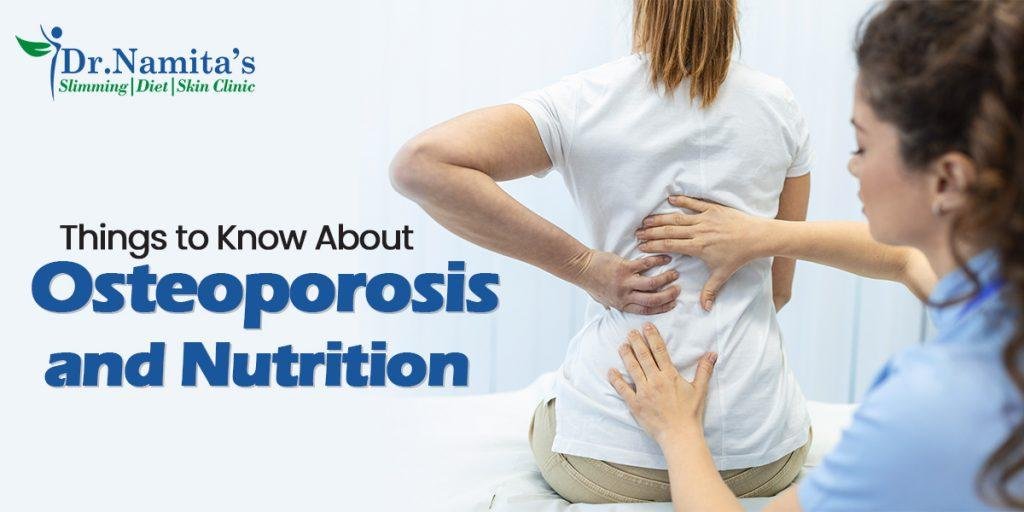Osteoporosis is a disorder that produces brittle and weak bones. Because bone is living tissue, the body constantly breaks it down and rebuilds it. When osteoporosis develops, it disrupts new bone development but does not slow the breakdown of the existing bone. Postmenopausal women are the most prone to osteoporosis. Women and the elderly are more susceptible to this illness.
Being smaller or thinner than usual, smoking and drinking heavily, and having a family history of osteoporosis are all risk factors for this disorder. Because osteoporosis weakens the bones, persons who have it are more prone to fractures, such as vertebral, wrist, and hip fractures.
Fortunately, there are strategies to enhance the bone mineral density and minimize fracture risk if you have osteoporosis, as well as preventive measures you may take.
Various lifestyle modifications and drugs can be used to prevent or treat this illness (consult the Best Diet Coach in Noida).
Nutrients to concentrate on-
There is specific dietary advice to be aware of if you have osteoporosis or wish to lower your chance of getting osteoporosis.
Not consuming enough of the following nutrients, for example, may put you at risk for poor bone mineral density and osteoporosis.
Protein accounts for around 50% of your bone volume and 13% of your bone mass, therefore getting adequate protein on a regular basis is critical for bone health.
Suboptimal protein consumption raises the risk of low bone mineral density, whereas older persons who consume more protein have better bone mineral density and are less likely to fracture.
As a result, some osteoporosis specialists recommend a protein consumption of 1.0-1.2 grams per kg (.45-.54 grams per pound) per day, which is significantly more than the current RDA i.e. 8 grams per kg of body weight (0.36 grams per pound).
Calcium
Calcium is required by your body to sustain healthy bones, which are continually remodelled. Calcium is required for the formation of new bone tissue.
As a result, if you have osteoporosis, it is critical that you consume the required levels of calcium in your diet.
But this does not always imply taking calcium supplements. Even though calcium is necessary for bone health, it is best to receive your calcium through meals whenever feasible. This is due to research linking high-dose calcium supplements to an increased risk of heart disease.
While some people may require calcium supplements to treat osteoporosis, others may be able to obtain adequate calcium through foods such as yoghurt, cheese, dark leafy greens, beans, nuts, and seeds.
If you’re unclear about whether or not you should take calcium supplements, seek guidance from your osteoporosis care provider.
Vitamin D
Your body cannot absorb calcium adequately if you do not have enough vitamin D. As a result, maintaining appropriate vitamin D levels is crucial. Unfortunately, vitamin D inadequacy and insufficiency are quite frequent.
Poor vitamin D levels might raise your risk of osteoporosis and low bone mineral density. Supplementation may be required for persons with low or insufficient vitamin D levels. This is because vitamin D is exclusively found in a few foods, such as fatty fish.
Your healthcare practitioner can test your vitamin D levels and, if necessary, provide a vitamin D supplement based on your level of insufficiency or deficiency.
Other vitamins and minerals
Aside from protein, calcium, and vitamin D, a variety of nutrients are required to maintain healthy bones and may have a role in lowering the risk of developing low bone mineral density and osteoporosis.
“Keep in mind that if your diet lacks suitable levels of certain of the nutrients listed below, you may need to replenish with them,” said Dr Namita Nadar(Best Nutritionist in Noida).
Magnesium: Your body needs magnesium to maintain bone health, and a lack of magnesium in your diet may raise your chances of developing osteoporosis. Furthermore, as you get older, your capacity to maintain adequate magnesium levels reduces. Magnesium supplements assist elderly women to enhance bone mineral density and reduce fracture risk. Magnesium is present in foods such as beans and vegetables.
Vitamin K: Vitamin K is required for protein activity in bone development and preservation. A low dietary vitamin K intake is linked to an increased risk of fracture. Vitamin K1 may be found in green leafy vegetables such as spinach and kale, as well as vegetable oils, but vitamin K2 can be found in animal products such as cheese and chicken, as well as fermented meals.
Top Nutritionist in Noida advises following a diet high in nutrients required for healthy bones and low in foods and beverages that may affect your skeletal system is critical whether you currently have osteoporosis or are seeking to lower your chance of developing osteoporosis.
A diet heavy in protein and bone-protective elements such as calcium and vitamin D, as well as magnesium and vitamin C, and low in fast food and soda, is ideal for bone health.
Consider working with a Top Dietician in Noida to create a bone health-promoting diet tailored to your unique requirements.
SOURCE : https://drnamitadietclinicnoida.com/

